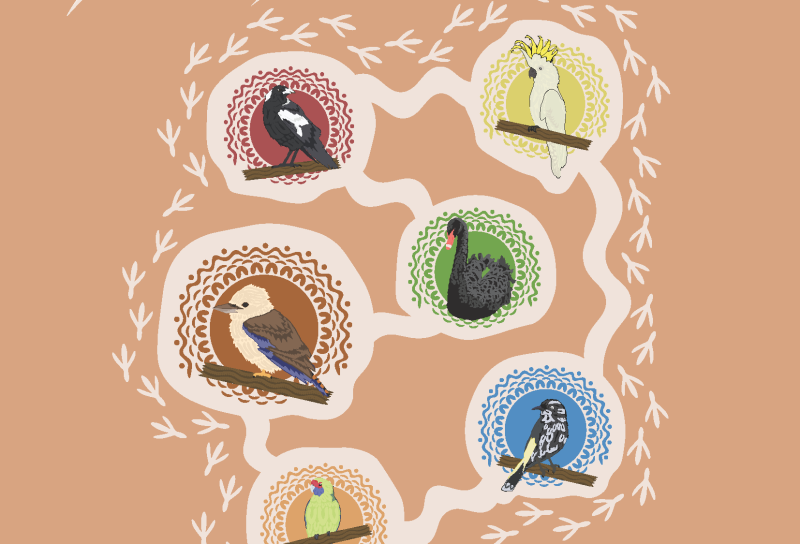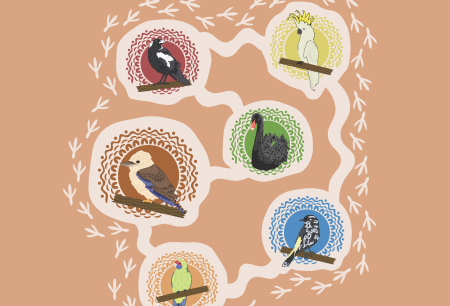What is the Believe Inquire Respond to Disclosures Research Report?
The Believe Inquire Respond to Disclosures Research Report decolonises child safety approaches by centring Aboriginal and Torres Strait Islander worldviews and ways of knowing, being and doing to improve responses to Aboriginal and Torres Strait Islander children and adults who are victim-survivors of child sexual assault.
SNAICC, in collaboration with Yamurrah, has developed the Believe Inquire Response to Disclosures (BIRD) Research Report. Both SNAICC and Yamurrah have strong expertise, leadership and shared commitment in giving a voice to victim-survivors of child sexual abuse. Yamurrah is a collective of First Nations experts working with victims and survivors of complex and collective trauma, as well as the clinicians and services who work with them.
The BIRD Report offers a national, trauma-informed and strengths-based training package and collection of resources, which are aligned with the National Strategy to Prevent and Respond to Child Sexual Abuse 2021-2030. The Report examines current approaches, literature, legislation and relevant training across Australia and has formulated key understandings and insights to guide the development of the training package and resources. The BIRD Report emphasises content to be covered in training, as well as locations where the training may be established for user testing sites.
Responses to Aboriginal and Torres Strait Islander child sexual abuse must be led by Aboriginal and Torres Strait Islander peoples. In Australia, settler-colonial racism, white privilege and white-Western bias have driven interventions and responses to child sexual abuse in our communities. This has exacerbated the trauma and marginalisation experienced by our communities and has not improved child safety. Our decolonised approach centres on Aboriginal and Torres Strait Islander worldviews and narratives. Before invasion, Aboriginal and Torres Strait Islander people operated under different legal systems, including lore and law. These culturally diverse and sophisticated systems managed conflict, child protection and human relations. These systems also carefully managed child safety and wellbeing, including kinship structures that protected, educated and collectively cared for children. These systems are still operational in many Aboriginal and Torres Strait Islander communities. We acknowledge that colonialism has fractured these systems in many Aboriginal and Torres Strait Islander communities.
The key understandings, insights and recommendations from these research findings have informed the development of the BIRD Report, training package and resources.
The BIRD Practice Framework
The BIRD Report has produced a Practice Framework, a culturally safe model for responding to disclosures of child sexual abuse.
The BIRD Practice Framework outlines key areas for workforce professional development to improve response to disclosures of child sexual abuse and encourages the worker to develop necessary skills that support not only the actual disclosure but also create an environment and skills conducive for a disclosure to occur and ensure the relevant safe and supportive post care.
The BIRD Report draws from First Nations research methodologies, including Yarning Circles and Yarning with Country. The animal and plant world are deeply integrated in Aboriginal and Torres Strait Islander belief and knowledge systems and birds, in particular, are central to Aboriginal and Torres Strait Islander cultures, spirituality and connection with Country. Fittingly, the BIRD Report draws inspiration and guidance from the wise, protective and collective behaviours of birds. They are significant in showing us how to work together, care for their young, signal distress and lead us and others to resources. Birds’ protective, caring and collaborative nature is reflected in the training program.
‘BIRD’ also acts as an acronym to help cement the program’s approach for health care professionals, Believe Inquire Respond and Disclose. The Report also involved a literature review exploring current approaches to responding to victim-survivors of child sexual assault and an analysis of relevant legislation and training across Australia.
Creating a safe ‘nest’ or environment, having knowledge of trauma-informed care for victim-survivors of child sexual abuse and having a network of skilled trauma-informed practitioners to consult with and reach consensus-based decision-making, are all precursors to implementing the BIRD Practice Framework.
BIRD Practice FrameworkResources
Join Us
Be part of our advocacy efforts and stay informed about our initiatives.
Become a member today and add your voice to the cause.



